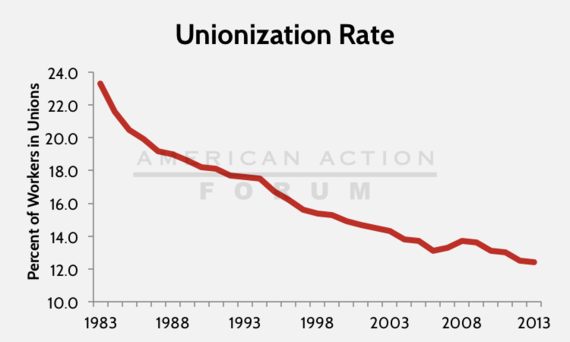There are rumors that national union leaders will soon launch a campaign regarding "prosperity economics." I found the title a bit confusing because I'm unaware of a branch of economics devoted to either "destitution" or "anti-prosperity." Still, I look forward to finding out what the "prosperity" caucus has in mind.
One might hope that it will constitute for core, structural reforms that (a) preserve our social safety net and entitlement programs while paring down the federal debt that generates economic drag; (b) modernize the tax code to eliminate distortions and raise international competitiveness; (c) bring a 21st century immigration system to the U.S.; (d) transform the embarrassing and underperforming K-12 education system; and (e) and clean out the regulatory overgrowth that limits U.S. economic flexibility and dynamism. Somehow I doubt it.
Instead, we are likely to see a call to spend federal dollars, and lots of them, on transportation and other infrastructure. There is, of course, nothing objectionable about bringing key pieces of infrastructure into the 21st century. Doing so would entail much more than simply spending the taxpayers' dollars. It would require establishing national goals, reforming the transportation and other infrastructure programs to support those goals, and recognizing that states and localities are even more important players in infrastructure spending. This would be a laudable initiative.
Instead, I think the goal is to pretend that we can return to the 1950s and 1960s when a high school- (or less-) educated union worker could feed a family of four on a construction job. But what this quaint notion ignores is that the U.S. benefited in that era from having a global near-monopoly as other countries recovered from the devastation of World War II. Why should a vision for the future in 2014 rely on the demise of other countries?
Why should we aspire, or even accept, sub-par educations for American workers that leave them unable to compete in every sector of both the U.S. economy and globally as well? Why not be serious about education reform, vocational training, and lifelong learning?
What a pessimistic vision!
And why should the vision rely on unions, whose unpopularity continues to rise, leading to a unionization rate in steady decline (and down to 11.3 percent in 2013).
I suspect the decline in unionization is actually at the core of the strategy. After all, the decline reflects the fact that unions are increasingly less popular; rates of unionization fell steadily from 14.3 percent among those aged 55 to 64, to 9.8 percent among those 25 to 34. Spending a lot of taxpayer money to pull in a few younger workers will be prosperous -- for the unions.
The U.S. should hope and provide for more -- for educations that lead to globally competitive workers; for the ability to make a living meeting the desires of global customers and not just the whims of federal infrastructure bureaucrats; and for a vibrant labor market that leads to rising real wages and multiple job opportunities.
The notion that prosperity is found by conceding to educational failure and reliance on government spending programs is a pessimistic vision.

